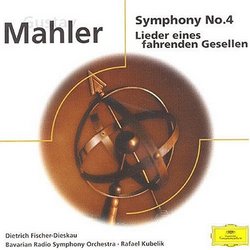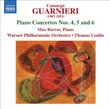| All Artists: Gustav Mahler Title: Mahler: Symphony No. 4; Lieder eines fahrenden Gesellen Members Wishing: 0 Total Copies: 0 Label: Universal Int'l Original Release Date: 1/1/2004 Re-Release Date: 5/26/2004 Album Type: Import Genres: Pop, Classical Styles: Vocal Pop, Symphonies Number of Discs: 1 SwapaCD Credits: 1 UPCs: 028946963722, 0028946963722 |
Search - Gustav Mahler :: Mahler: Symphony No. 4; Lieder eines fahrenden Gesellen
 | Gustav Mahler Mahler: Symphony No. 4; Lieder eines fahrenden Gesellen Genres: Pop, Classical
|
Larger Image |
CD DetailsSimilar CDs
|
CD ReviewsMahler, with exuberance and wistfulness. jean couture | Quebec city - Canada | 10/16/2006 (5 out of 5 stars) "This budget-priced reissue introduces two great works (Symphony No.4 + Songs of a Wayfarer) in delightful performances led by Rafael Kubelik and the Bavarian RSO. The famous Lieder are from 1968 and were sung by one of the finest baritones, Dietrich Fischer-Dieskau; this recording is exactly the same as the one we find as a coupling to the First Symphony on DG. It is a masterful example on how the work should be played, a lesson in artistic and stylistic equilibrium. No wonder it's considered a definitive account by many reviewers. It is likely to be compared with the equally proverbial Bohm/BPO on DG, again, with Fischer-Dieskau. Mahler scholar Henry-Louis de La Grange's analysis of the symphony shows some interesting points: "For its time, the Fourth Symphony was an avant-garde work, a form of self-discovery for the composer himself, bringing with it as it did an entirely unexpected evolution in his style that led to greater rigueur and concentration (ref.: andante.com)." It is interesting to note, though, that "in contrast to other works and other periods in Mahler's life [...] the Fourth breathes an atmosphere of well-being, relaxation and lyricism in spite of the fact that it was composed at a time of great stress." In the hands of Kubelik, the 4th Symphony goes without a hitch, much of its aural beauty thoroughly delineated thanks to the conductor's abilities and the ensuing fine orchestral playing. The kind of "rustic" atmosphere Mahler subtly infuses to his work is wholly characteristic and here the conductor seizes extremely well the elusive tone of the music. Elsie Morison sings wonderfully in the Wunderhorn finale. The recording, which took place in Munich, is still one of those monuments (if i can say that) in regards to this deservedly well known chef-d'oeuvre. The vibrant, ever changing accents of Mahler's concept and the particular mood of the work are well characterized. Perhaps not quite up to the reference-level attained by the same team in the First Symphony, this traversal of the Fourth is still an exhilarating version with much in it to admire. At times, Kubelik's tempi give the impression of being too brisk, and timings -around 51:48- show that it really is swift when compared to many others (the quite nice 1982 Tennstedt/LPO on EMI runs at 54:00, the classic 1958 Reiner/Chicago goes for 53:40, the 1968 Abravanel/Utah finishes at 52:00 whereas the recent Inbal/Frankfurt on Denon clocks at 56:00). But i'd be inclined to conclude with some reviewers that Kubelik is, perhaps, closer to what Mahler's own tempi would have been ideally (btw, many thanks to Musicus for indicating an error about timings in my original review). The sonics, though a bit lightweight in the bass region, are honest by Deutsche Grammophon standards. We've heard worse from DG, in fact. In comparison, the 1977 Kegel/Leipzig RSO version (Berlin Classics) seems a bit flat musically and somewhat lacking in contrast, not to mention the playing at the end of the third movement (Ruhevoll) which is not quite together. That is said with regret because the inner movements are well effected for the most part and Celestina Casapietra has an attractive voice with much of the requisite qualities. Unlike his Carmina Burana on DG, a remarkable account, Kegel's take on Mahler doesn't seem to open or expand the work as it should. Still, the latter's Fourth is way better and offers a more viable alternative than the generally vague and uninteresting Gatti/RPO (on RCA). Conductor Yannick Nezet-Seguin and the Orchestre Metropolitain of Montreal (released 2004 on Atma Classique) offer something of a mixed bag, i'm afraid. At this stage, their turn on Mahler is fairly good but, alas, the third movement somewhat lacks breadth and just that small dose of vitality which could have made the difference. And, for what its worth, the fourth movement leaves something to be desired - despite superb singing by soprano Karina Gauvin. However, like Antoni Wit on Naxos, with whom they share many points, Nezet-Seguin and his team cautiously avoid the trap of ragged ensemble playing. As far as `best performance' is concerned, there are several memorable recordings of the Fourth---notably from Levi/Atlanta, Abbado/Berlin, Kondrashin/Moscow, Bernstein/NY, Boulez/Cleveland, Szell/Cleveland, Klemperer/Philharmonia, Kletzki/Philharmonia and Reiner/Chicago. All those should spring to mind as representative in a crowded catalog (there are well above 100 versions!). A recording i cherish is Klaus Tennstedt's LPO account on EMI (although some will undoubtedly disagree): Negligible weak spots aside, try it for some subsurface intensity opposing multiple layers of nuances in what is a sensible perception of the mahlerian idiom (btw, their Sixth Symphony is particularly magnificent). Like Kegel, Tennstedt was a most underrated conductor -imho- (he's done some really good Wagner as well). To come back to Kubelik, his Mahler certainly ranks among the greats. Without a doubt, a vast choice waits to be explored..." One of the finest Mahler fourths on record L. Johan Modée | Earth | 06/29/2007 (5 out of 5 stars) "Rafael Kubelik's 1968 interpretation of Mahler's fourth symphony has for long, and for good reasons, been ranked as one of the great classic accounts of this work. Evidently, Kubelik's bohemian sensitiveness enables him to bring fourth the lyrical, nostalgic character of this symphony like no one else - a feature which is evident in all of his Mahler interpretations, but especially in the "Wunderhorn" symphonies (nos. 1-4).
Another thing that differentiates this recording from many others is its tempo choices. It's a quite swift fourth, in my view ideally paced, which never drags. This is especially the case with the third movement, which stops at 18.47. Elsie Morison, not a too well-known soprano, makes a fine contribution in the finale, which is sufficiently child-like without falling into the trap of mannerism. The orchestra, Symphonieorchester des Bayerisch Rundfunks under Kubelik's baton, is also excellent. In particular, the woodwinds are outstanding. Finally, the DG engineers have produced a natural, balanced though quite close-miked recording. In sum, this is one of the very best recordings of Mahler's fourth symphony. It should be the first choice, and it belongs to every serious music collection. (This recording is included in the DG "Collector's Edition" Kubelik Mahler box.) " |

 Track Listings (8) - Disc #1
Track Listings (8) - Disc #1




















